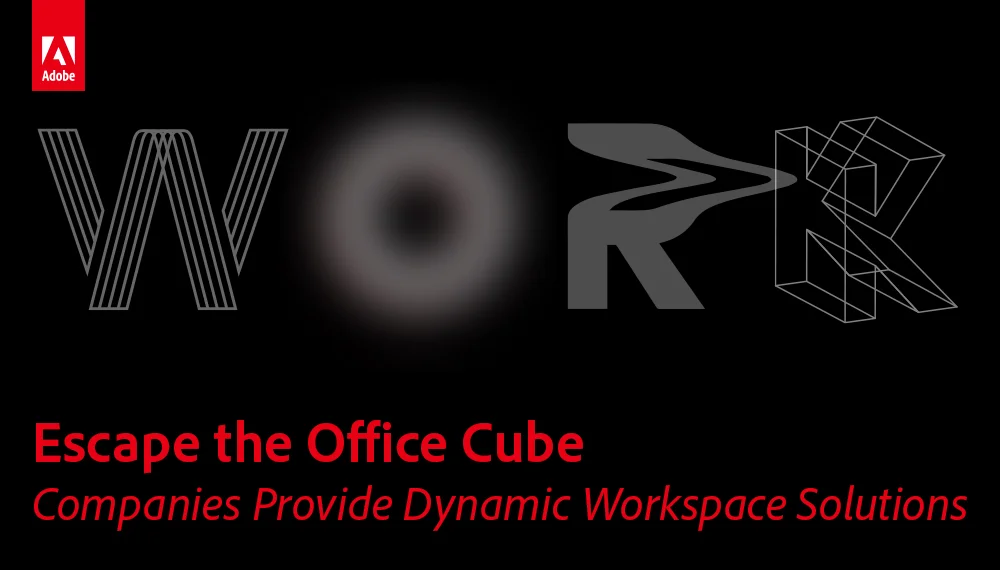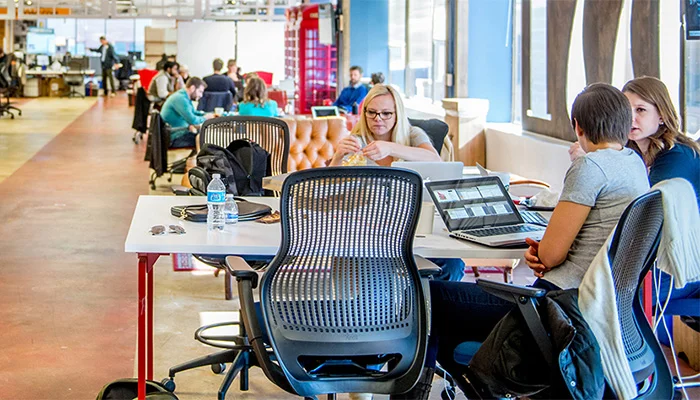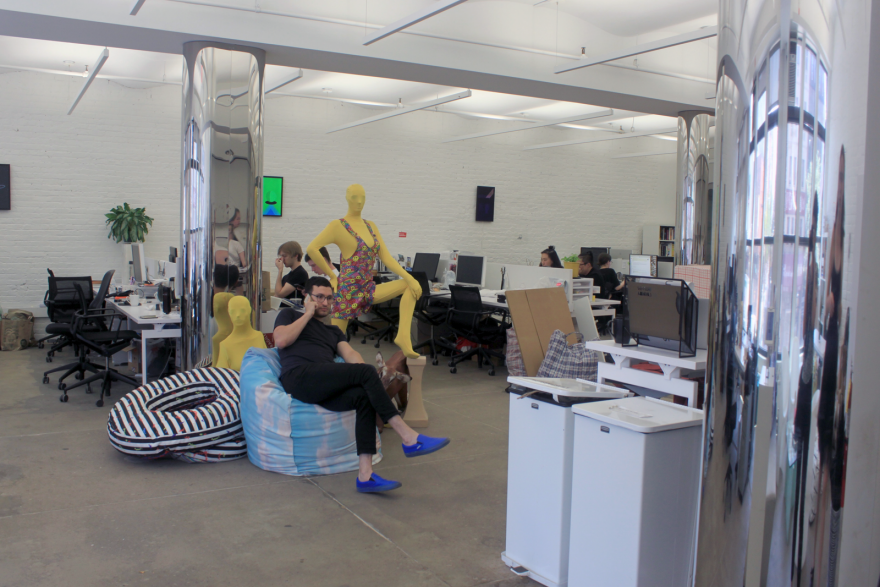Traditionally, a professional workspace community is designed to function as an extension of your employer’s brand, seamlessly integrating key attributes and defining characteristics of the company. From the location of your office to where you sit each day to what type of equipment is required, your effectiveness was directly tied to the physical components of your company’s office space. Before the digital revolution entirely changed the way we live and work, providing customized solutions for today’s mobile workforce, this centralized workspace also provided a productive hub for employees to collaborate and meet with partners and clients.
To Co-Work Or Not To Co-Work? Four Considerations To Make When Selecting Your Startup's Office Space
The age of co-working is upon us: WeWork is now Manhattan’s largest private tenant in terms of square feet. For the uninitiated, co-working describes shared office space that can be rented out per desk, on a monthly basis. In some ways, co-working is a natural extension of the sharing economy: The experience is closer to a membership, with office space and perks being largely shared.
According to Deskmag’s Global Co-Working Survey, we’ll see over 10,000 co-working spaces open by the end of 2016. Co-working has become popular, and for good reason: The monthly subscription model allows for added flexibility compared to typical leases that lock tenants into spaces for years at a time. They are often highly curated and well-decorated, and consider themselves to be collaborative communities.
HSBC moves 300 staff into coworking space in Hong Kong
The idea that coworking is primarily for the self-employed, tech startups and other small firms who can’t afford permanent offices in the world’s expensive cities has been challenged with the news HSBC has moved 300 staff into a coworking space in Hong Kong, according to a report in the South China Morning Post. The bank has rented the workstations in WeWork’s space in Causeway Bay, one of the world’s most expensive districts for offices and shops. The bank has taken out a large scale corporate membership with WeWork for the 300 members of its digital and transformation team. According to the report, a spokesman from CBRE claimed that the move is less about saving money than it is with providing short term flexibility in a time of economic uncertainty. However you view that, the bank is saving as much as HK$2.45 million a month with the move (£240,000 or $320,000). The annual cost savings are estimated at HK$23,640 per person.
10 Unique Coworking Spaces Attracting Remote Workers
Coworking spaces are officially the new places to do business, with office-rental companies like WeWork (valued at $16 billion) leading the pack.
But across the world, there are new and innovative coworking companies popping up to accommodate remote workers, a segment that’s growing extremely quickly. Intuit predicts that by 2020, 40% of the U.S. workforce will be freelancers (more than 60 million people).
Investors are making big bets on the industry's future. Coworking startup Industrious, with 12 locales around the U.S., just landed a $37 million Series B round last week.
City’s Largest Tech Space Launched Near GCT
NEW YORK CITY–Grand Central Tech, along with Deputy Mayor Alicia Glen and the NYC Economic Development Corp., have launched the Hub @ GCT, New York’s largest urban tech space.
Adjacent to Grand Central Terminal, the 50,000-square-foot Midtown property will host growth-stage companies in the urban tech sector. The Hub recently received funding from the city’s Urban Tech NYC initiative, which offers space, equipment, pilot opportunities and shared resources to companies working to address the city’s urban challenges.
Knoll Report: The Rise of Co-working
Today, a broad range of businesses — ranging from technology and professional service firms to consumer product companies — form a growing ecosystem that recognizes the value of flexibility, community and shared resources. Businesses of all sizes and types — ranging from small start-ups to global enterprises — choose to locate employees or teams in shared work environments, either temporarily or on an ongoing basis.
London’s sky high property costs driving uptake of coworking, claims report
Start-up tech firms in London face the world’s highest property costs and the result is a boom in coworking, according to a report from Knight Frank. The research, undertaken as part of Knight Frank’s 2017 Global Cities Report, examines the cost of leasing and fitting-out 600 sq ft of office space in the tech and creative districts of the world’s leading cities. Intense demand for space in Shoreditch, London, has seen start-up office costs soar with Knight Frank calculating 600 sq ft of office space to cost US$66,706 per year – the highest of any creative district in the world. This is followed by Brooklyn in New York (US$62,736), Mid-Market in San Francisco (US$61,680), 1st, 2nd and 9th Districts in Paris (US$57,426) and the Seaport District in Boston (US$50,700). However, London’s burgeoning coworking market also shows how firms are using the model to overcome the challenge of finding somewhere to work at an appropriate cost.
Barry Sternlicht wouldn’t invest in WeWork
Barry Sternlicht doesn’t understand why people invest in WeWork at its current, $16 billion valuation. “Why would you go to to WeWorks (sic) at 300 times EBITDA. If you got shares that are at zero value, like realty cash and incredible compensation,” he said Tuesday, according to a transcript. “When these things go down they do not go from 16 to 14, they go from 16 to 2. There is no elevator down, you hit the floor.”
WeWork , the New York-based co-working company, reached a $16 billion valuation with its latest funding round in March and has raised around $1.4 billion from investors to date. Real estate bigwigs Mort Zuckerman and Bill Rudin are among the firm’s backers. But although the company is profitable, it is making less money than initially hoped.
A New Company Aims To Edge In On WeWork With A Totally New Business Model
WeWork, a company that offers shared, flexibile-lease offices in 113 locations in 33 countries, has achieved a position in the "coworking" world similar to that of Starbucks in the coffee world. While plenty of smaller companies offer coworking in a myriad of flavors—focusing, for instance, on designers or startups—they’re not a significant threat to WeWork’s business. No Dunkin' Donuts has emerged. A bigger potential problem for WeWork as it strives to live up to its $16 billion valuation would be if the landlords and companies it works with build their own hip office spaces.
With the Success of Coworking Spaces, Should You Launch Your Own?
Look hard enough and you’re sure to find successful entrepreneurs who’ve built diversified businesses from the ground up. But when you’re launching, it’s hard to find the funds for office space. And working out of the home isn’t always feasible—or fun.
That’s why more and more entrepreneurs are choosing coworking over office spaces that might be considered to be isolated home offices or spendy commercial suites. Coworking offers a great compromise between the two, bringing all the collaborative, synergistic benefits of traditional offices with none of the cost or cultural issues.
Moneypenny opens the doors to pioneering workspace for world-class legal receptionists
Moneypenny, the legal sector’s leading outsourced switchboard and telephone answering specialist, is today unveiling its new £15m headquarters.
Designed to create “the happiest workplace in the UK”, the pioneering building reflects the company’s rapid growth and has been built based on the feedback of its 500 employees – many of whom represent the country’s leading law firms and legal practices.
Inside Staples, a sunny co-working Workbar space
Inside the store, the Workbar space is set back from the retail aisles, and there’s a path on the carpeting that leads to its glass doors. Peter Scala, Staples’ executive vice president for merchandising, jokingly compared it to a yellow brick road.
Brooklyn co-working company Industrious raises $37M
Brooklyn-based co-working company Industrious raised $37 million in a Series B funding round, the startup announced Tuesday.
Riverwood Capital led the round, which also included Outlook Ventures and Maplewood and brought Industrious’ total funding to $51 million to date.
Industrious is one of a handful of firms looking to challenge $16 billion behemoth WeWork in the nascent co-working industry. The firm’s co-founder and CEO Jamie Hodari told The Real Deal that it plans to spend the bulk of its new funds on building out and opening new co-working spaces across the U.S. It currently runs a dozen spaces, including one in Brooklyn at 594 Dean Street, and wants to add 12 more.
Gabriela Hersham on launching a coworking space in the heart of London's tech hub
To launch your own business is one thing; to decide that you're going to create a coworking company in one of the most competitive cities in the world is another challenge altogether. But that's exactly what Gabriela Hersham has achieved in less than two years.
She's the founder of Huckletree, a relatively new addition to London's thriving coworking scene, with her first branch launched in Clerkenwell two years ago, and now another open in Shoreditch.
Our Coworking Space Failed — Yours Doesn’t Have To
You’ve likely heard of the benefits of collaboration in a coworking space, especially during a business’s early stages. There are many recent studies touting the advantages — 89% of people report being happier due to coworking; 67% say coworking improved their professional success.
Naturally, here at Shopify, we wanted to build one of our own. How hard could it be?
Our Partner Program works with third-party designers, developers, and creatives from around the world who provide services to Shopify merchants. Many of our partners have a hard time finding their first client, and although they have tons of design and development skills, they sometimes need a little help on the business side of things. That’s where the idea for the Shopify Partner Studio came about.
Co-Working Spaces Offer More Than Proximity -- They Also Increase Happiness And Effectiveness At Work
Co-working spaces are popping up everywhere, and there’s a reason why. It’s not just the growth in freelancers and entrepreneurs, nor their physical need for a desk. It turns out that co-working’s biggest advantage is the intangible part — the sense of urgency, community and peer-to-peer learning.
Crowd has $53M co-working target in NoMad
Manhattan-focused crowdfunding platform, Prodigy Network has launched a collective investment campaign for a property of co-working spaces in Manhattan.
Located at 331 Park Avenue South, the 37,000 s/f NoMad property will become part of a group of buildings know as The Assemblage that provides shared office space for members.
Prodigy Network is currently finalizing the last phase of the crowdfunding campaign for The Assemblage/25th Street, also in NoMad, which is now in its pre-construction stage.
National startup boom reaches Detroit
Conditions are just right nationally and in Detroit for a startup boom, according to a Detroit Free Press article. And that's exactly what we're seeing.
The article begins at the business incubator and coworking space TechTown Detroit, where "the interest is so intense from start-ups seeking space there that the organization may need to find more to squeeze them all in," writes Frank Witsil. "The co-working space … is nearly full at 67 companies; many are start-ups. At this rate, it could eventually overflow."
Making way for Millennials: How to Design the Workplace of the Future.
The world of boxed cubicles, bosses and 9 – 5 is melting away, and the rhetoric around work is less about work to live and more about live to work. Millennials value their career first, and their ambitions are couched in passionate, creative outlets, whatever the industry. Their parents dreamt of backyards and boats on the weekend, millennials want to feel fulfilled and free Monday through Sunday.
Statistics stating that 40 per cent of the United States workforce will be freelance by 2020 (Forbes) suggest these changes aren’t simply a floating trend, but rather a complete evolution in the way we work. In Australia, the number of independent contractors or self-employed people who did not employ others, as a percentage of the workforce, has already increased from 6.7 per cent in 1978 to 9 per cent in 2013. This statistic is set to accelerate in coming years.
EW INC on How Co-Working Spaces Must Evolve for the Creative Entrepreneur
What do you do when you come up with the idea for a business that defies categorization and tried and true entrepreneurial norms? When it comes to going out on your own and starting your own business, the truth is there is no handbook and it's almost always daunting. So where do you find the right support system when you're pioneering new ideas and new ways of doing something?
"That's the thing that is a little bit tough about the moment that we're living in," explains Julia Kaganskiy, director of the NEW INC incubator program. "A lot of the safety nets that used to exist are disappearing—whether it's things like funding for the arts or more permanent jobs. So everything is becoming a bit destabilized in that way, which puts a lot more pressure on the individual to be more entrepreneurial and figure out a strategy for themselves. This is being sold to us as empowerment, but in reality it just means that everyone has to be an expert in business, marketing, PR, design, all of these things, and we can't pretend that it's realistic to expect that of people." Not long ago, all these aforementioned responsibilities were held solely on the shoulders of whoever was going out on their own and venturing into new professional territories but nowadays, institutions and co-working spaces are starting to catch on: many freelancers and entrepreneurs need help.

























